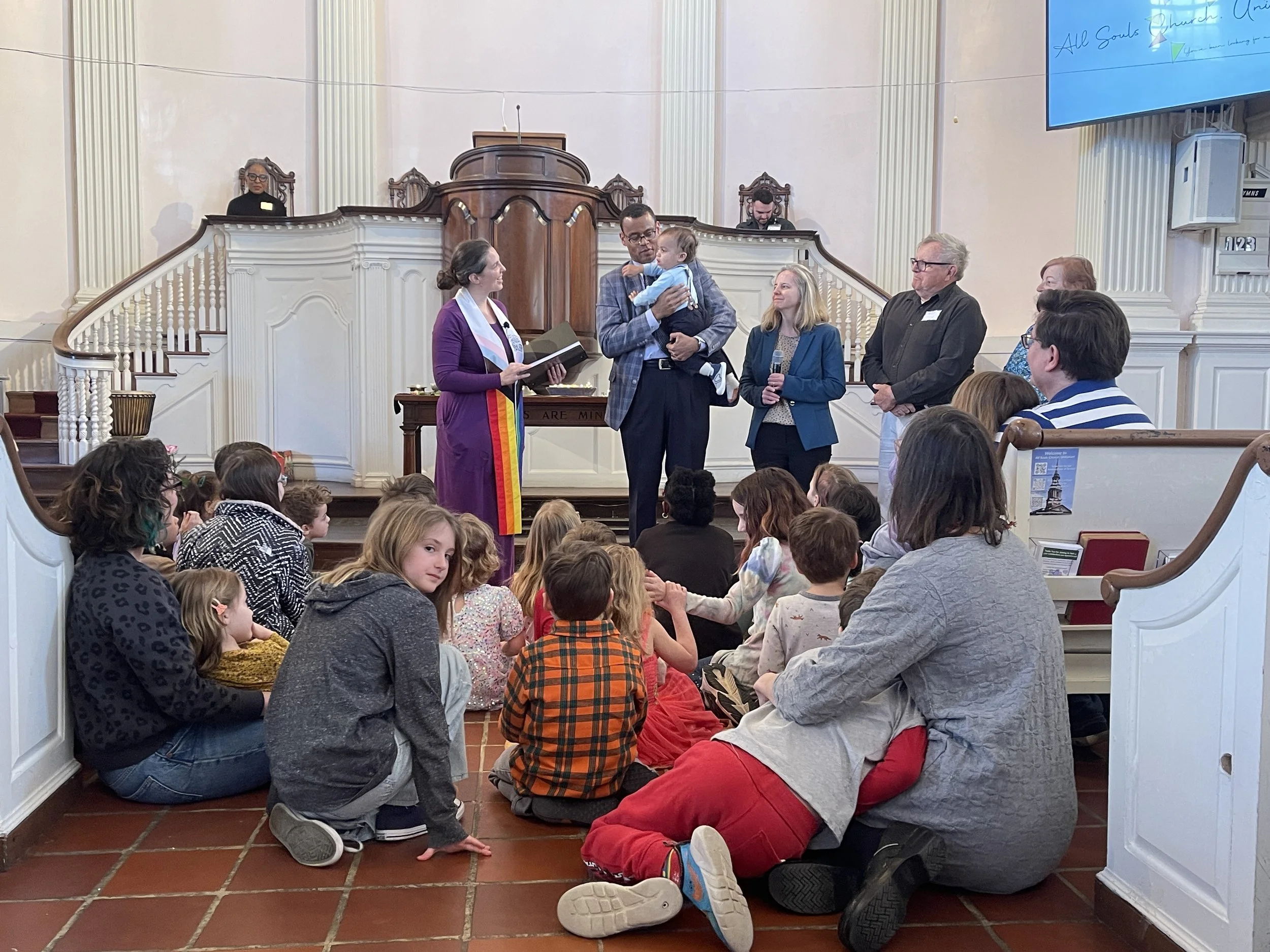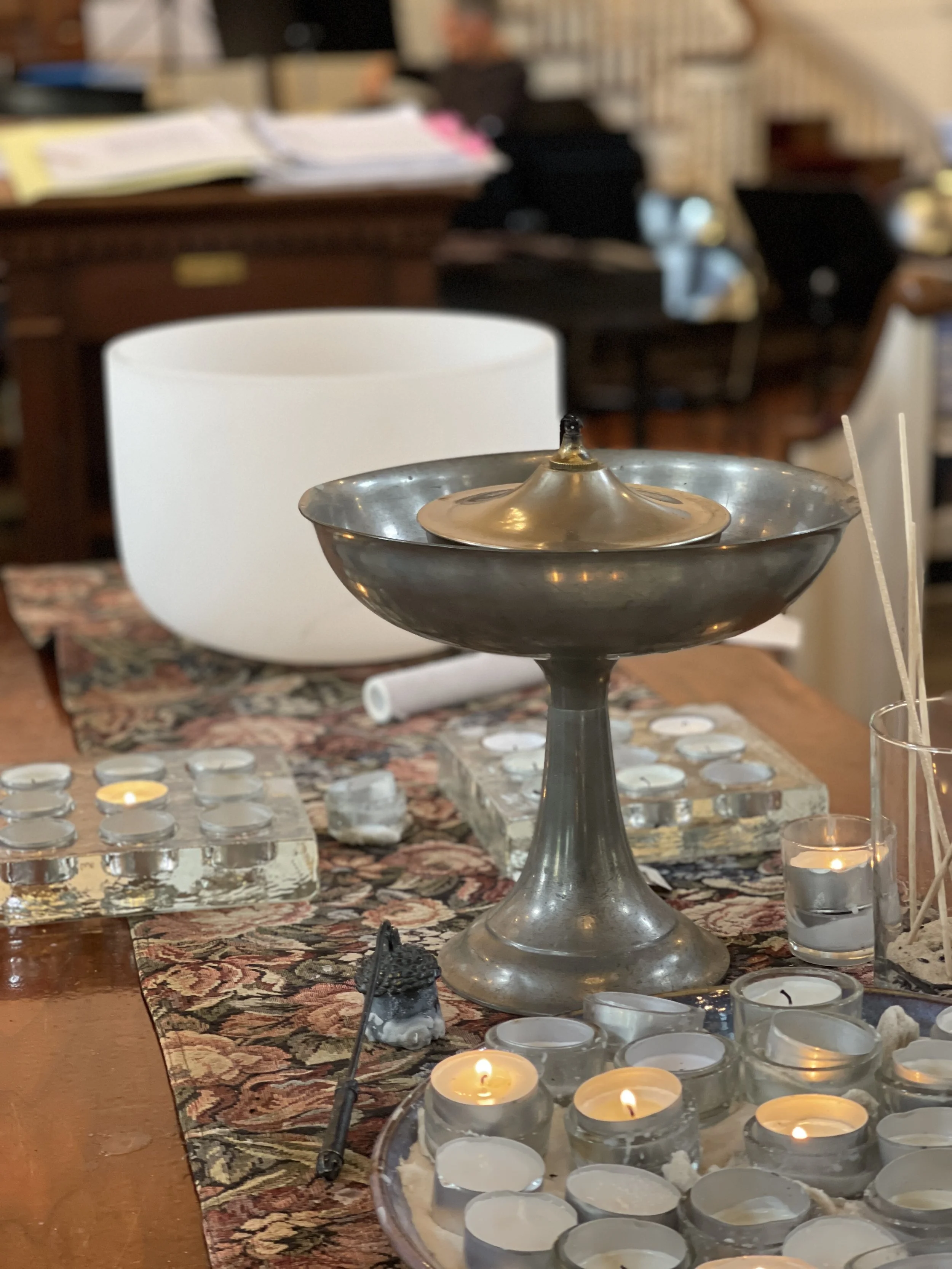
We are so glad you found us!
All Souls Choir performing in the main sanctuary.
The All Souls Experience
Welcome to All Souls Church Unitarian! Here's where you can learn more about our dynamic worship, our diverse community, and our work in the world.
We gather for worship on Sunday mornings at 10:30 AM ET, both in person and on Zoom.
You can also check out previous worship services.
Child dedication in the main sanctuary.
-
We begin the worship service at 10:30 AM.
People start gathering in the sanctuary 10 – 15 minutes before the service. If you’d like to ask questions about the church, show up a bit earlier to speak with one of our greeters, stationed by the main entrance.
The Zoom room for the online service also opens approximately 15 minutes before the service. When you log in, you’ll arrive in a waiting room and the host will let you into the main room.
-
Every Sunday is different, but there are some basic elements. We start with and enjoy live music throughout the service. After a call to worship, the congregation sings an opening hymn and is then welcomed to church by one of our worship associates. We have a brief greeting period, when you can say hi to your neighbors in the pews. After more music, we sometimes hear a Story for All Ages or witness the dedication of children; we always listen to morning announcements and a prayer. After a hymn and some silence, the minister or a guest preacher delivers a sermon. We then pass the offering plate, accompanied by more music. After a final hymn, we receive a benediction before heading to coffee hour or to a small group gathering after the service, or out into the world to start another week.
You can head to our YouTube channel to watch past worship services.
-
Come as you are! Some of our congregants wear their Sunday best (and church hats appear on the Sunday of the spring tea), while others show up in jeans and T-shirt. Most choose something in between. Children should wear comfortable play clothes as activities can sometimes get messy.
-
Early in the service, we invite visitors to stand or raise their hand. You may identify yourself or not; whatever you’re comfortable doing.
-
We see giving as an expression of generosity and an act of faith. If you are a visitor or guest at All Souls, we hope you won’t feel compelled to give when the plate is passed. But, if you feel inspired to give in support of All Souls mission and ministries, we are grateful! We do pass a collection plate at one point in the service to maintain the well-being of the church and support community organizations, and we appreciate whatever you can give, but it is not obligatory.
-
Nursery care and classes for children and teens run during the services. On the first Sunday of each month, children start in the sanctuary with their parents for a Story for All Ages; otherwise, they start in their classrooms. Ask an usher or greeter for directions to the classrooms. You’re always welcome to keep your child with you, and you can also participate in your child’s class. The nursery has listening devices to hear the service. For more information, see our Children and Youth Religigous Education (CYRE) page.
-
Though we necessarily fall short, we strive for Beloved Community. We welcome all who enter, regardless of race, color, religious background, gender, affectional or sexual orientation, age, abilities or limitations, national origin, or marital status. We are interracial and interreligious couples, mixed-race children and adults, LGBTQ people, and folks of all ages. We are humanists, atheists, agnostics, pagans, Christians, Jews, Muslims, and Hindus. Whoever you are, you can find a place here.
-
Of course! We welcome all. The ramp to the main floor starts from the corner of 16th and Harvard, and an elevator can take you to the balcony level. Large print and Braille hymnals are available; please ask an usher. We have ASL interpretation at our service. If you or your child have a unique special need, you may want to let us know in advance how best to accommodate you. Please call the church (202.332.5266) or email us at allsouls(at)allsouls.ws
-
You can learn a lot about us by exploring the webiste. If you still have questions or would like to talk to someone, feel free to set up an appointment with our minister Rev. Anastassia Zinke.
Preparing for Your First Visit
We know. It’s a mouthful. The traditions that form the foundation of our religious heritage — Unitarianism and Universalism — are at the heart of our shared values and what guides us in the world.
What is a Unitarian Universalist?
The chalice, a flame in a cup or bowl, is the symbol of our faith.

Considering Membership at All Souls?
If you are considering All Souls as your spiritual home base, a member of our welcome team would be happy to talk with you about the next steps.
Volunteers gather in the library to write postcards to safeguard our democracy as part of the Reeb Project for Voting Rights


